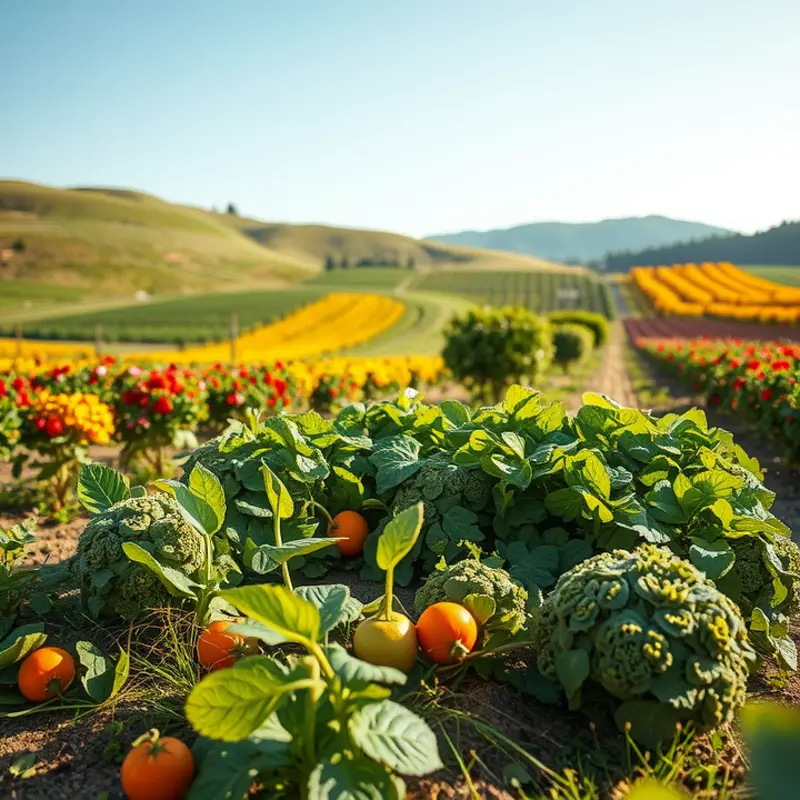Adopting an ethical diet is more than just a personal choice; it’s a pivotal step towards environmental preservation. As awareness around climate change, sustainable farming, and animal welfare rises, individuals can make impactful decisions through their dietary habits. This guide offers practical strategies for environmentally-conscious individuals looking to embrace eco-friendly food choices, ensuring that each meal contributes positively to the planet. By transitioning to an ethical diet, you not only benefit your health but also advocate for a healthier Earth.
Mindful Eating: Making Thoughtful Choices

Mindful eating is not just about nourishment; it’s a conscious approach to evaluating the ethical and environmental impact of our food choices. By being deliberate about what we consume, we foster an ethical dietary pattern that respects both our bodies and the planet.
A primary element of mindful eating is the emphasis on local, seasonal, and sustainably sourced foods. By selecting locally produced items, we not only support regional farmers but also reduce the carbon footprint associated with transporting goods over long distances. Seasonal eating, in particular, ensures fresher produce that requires less energy for storage and transportation, minimizing environmental impacts.
Sustainability is also tied to reducing food waste, an essential aspect of mindful eating. Simple strategies, such as meal planning and portion control, can significantly cut down on food wastage. Embracing leftovers and creatively transforming them into new dishes maintains a cycle of thoughtful consumption, ensuring resources are not squandered.
Prioritizing a plant-based diet is another crucial strategy in mindful eating. By incorporating more fruits, vegetables, legumes, and grains into our meals, we reduce reliance on resource-intensive animal products. Not only does this support environmental sustainability, but it also broadens our nutritional intake. To ease into plant-based eating, consider gradual substitutions: tofu, legumes, or mushrooms can replace meat in many recipes, offering texture and flavor with less environmental cost. Explore more ideas in this easy plant-based eating guide.
Understanding food labels is an invaluable skill for anyone serious about mindful eating. These labels provide insights into the origins and sustainability of food products. Look for certifications indicating organic farming or fair trade practices, which assure ethical production and fair compensation for producers.
Incorporating ethically produced items into daily meals requires creativity and willingness to experiment with new ingredients and cooking methods. Beans, quinoa, nuts, and seeds are nutrient-rich, sustainably-grown staples that offer immense versatility and variety.
Mindful eating inherently ties into addressing unconscious eating habits, where individuals consume food without considering its impact. Conscious efforts can help transform the eating experience into a more intentional practice, promoting better health and environmental outcomes.
By conscientiously choosing what we eat, mindful eating becomes a vehicle for honoring the intricate connection between humanity and the earth. Each meal then morphs into an opportunity for making thoughtful choices that nurture our personal well-being while safeguarding the planet.
From Farm to Fork: Understanding Food Sources

Choosing what to eat is one of the most impactful decisions we make. Understanding your food’s journey from farm to fork can transform these choices into powerful statements of sustainability and ethics. By supporting local farmers, we not only invest in our communities but also significantly reduce the carbon footprint associated with long-distance transport.
When you buy from local sources, the food often travels fewer miles to reach your plate. This reduction in transport emissions is an invaluable contribution to combating climate change. Moreover, produce harvested closer to home is fresher and, often, more nutritious as it is picked at peak ripeness.
Supporting local agriculture also means investing in the community. It creates jobs and encourages a diversified and resilient economy. Local farmers are more likely to use sustainable practices that prioritize the health of the soil and the local ecosystem. By choosing products from these sources, we reduce the environmental degradation typically associated with large-scale industrial farming.
To begin sourcing food sustainably, start by exploring local farmers’ markets. When visiting a market, have a chat with the vendors. Understanding their farming practices can guide you in making informed decisions. Look for terms such as “organic,” “pesticide-free,” and “non-GMO,” while also considering the farm’s commitment to fair labor practices.
Community-supported agriculture (CSA) programs offer another fantastic way to source sustainably. By becoming a member, you essentially purchase a share of the farm’s harvest. This not only provides you with a regular supply of fresh produce but also supports farmers directly. Many CSA programs offer seasonal produce, which is not only aligned with natural growth cycles but also encourages a dietary diversity that benefits health.
Additionally, consider choosing products that carry fair-trade certification. Fair trade ensures that producers in developing countries are paid fair prices and that their communities benefit from better working conditions. It’s an effective way to support ethical practices across global food supply chains.
Investing in organic, fair-trade, and locally sourced produce elevates the quality of what you consume while promoting sustainability. When ethical choices become habitual, the impact on the environment and society is profound.
For further guidance on minimizing waste and safely storing your locally sourced produce, you can explore tips available here: Eco-smart Kitchen Storage.
By embracing these practices, we take a pivotal step in crafting greener plates that nourish both body and planet. As we journey forward, let’s continue to explore how each bite can bolster well-being and the world’s health.
Final words
Transitioning to an ethical diet is an invaluable way to reduce your environmental footprint while fostering a healthier lifestyle. By embracing mindful eating and understanding your food sources, you can empower yourself and others to make environmentally-friendly choices. Each meal is an opportunity to support sustainable practices and contribute to a greener future. Remember that small, consistent changes can lead to significant impacts over time. Celebrate the journey towards an ethical diet as a testament to your commitment to the planet’s well-being.








